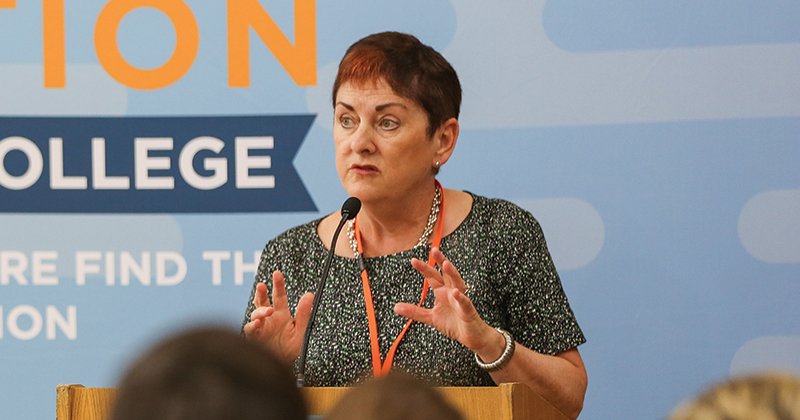Education unions have reacted with dismay to Ofsted’s new inspection regime, and demanded more action to tackle the negative impact of inspection.
The draft document, published today, sets out a new “holistic” and curriculum-focused approach to rating the quality of education in schools, along with a number of administrative changes to the way inspections are carried out. If approved, the document will govern Ofsted inspections from September 2019.
This is not the game-changer that many have hoped for and some had predicted
But the framework has drawn a muted response from unions, which want the inspectorate to go further to address serious concerns about teacher and leadership workload and teaching to the test.
Nick Brook, deputy general secretary at the NAHT school leaders’ union, said it was “not the game-changer that many have hoped for”, and warned of “widespread concern amongst school leaders”.
“There’s nothing here that will reduce stress and increase the reliability of judgements, which many say is sorely needed.
“Some of the things Ofsted are now heavily criticising schools for are of their own creation. It would be wrong for Ofsted to present themselves as blameless, but it would be equally wrong for us to object too strongly to their attempts to put this right now.”
However, Brook accepted that “a lot can change” during consultations, and urged school leaders to “keep calm and carry on” until the process is complete.
Dr Mary Bousted, joint general secretary of the National Education Union, said her organisation remained “deeply sceptical” about whether any of the “bold and ambitious claims” in the consultation would be realised.

“The uncomfortable truth for Ofsted is that the practices it deplores – the narrowing of the school curriculum and teaching to the test – have been the results of its own enforcement, through inspection, of a range of narrow measures to judge school quality,” she said.
“None of these narrow accountability measures are being abolished. Schools will still be measured on the percentage of their pupils following the EBacc, GCSE results, progress 8 and attainment 8.”
Bousted also questioned how inspectors would make qualitative judgments on the curriculum, and said England needs a “new system of school accountability”, rather than more “tinkering” with Ofsted.
“Ofsted’s own research shows that those HMI doing the trial inspections asked how they could make curriculum judgements in the time available for inspection. How complex, detailed, value-laden judgements will be made consistently across England’s 20,000 schools is the fundamental question – and one that Ofsted cannot answer.”

Geoff Barton, who leads the ASCL leadership union, said the new inspection regime was a “major change” and a “step in the right direction”, but he warned that Ofsted “needs to understand the pressures under which schools are operating”.
He said plans to judge schools on how they are working to achieve the government’s “ambition” for 90 per cent of pupils to be taking EBacc subjects were “misconceived”.
“This target is unachievable because there are nowhere near enough modern foreign language teachers in the system to teach that many pupils. It is nonsensical to judge schools on factors which are clearly outside their control and we will be pressing Ofsted to amend this section.”
Barton backed plans to judge leaders how how they manage workload and how schools use exclusions, but called for inspectors to take into account external factors that are causing the problem, such as reforms and school funding.








After attending 2 sessions outlining the changes and now reading the draft I think it falls far short of the breathe of fresh air the revised framework was being labelled as. I am thoroughly disappointed by the content of the framework.
The emphasis on the quality of the curriculum is commendable but performance tables still exist and standards in core subjects are the key accountability measure and will also remain as a key indicator when Ofsted RAG rate schools for inspection. There is now the curriculum hoop to jump through INADDITION to the standards agenda. Our curriculum is rich, deep and broad…. but there is a significant amount of work required to package it in the way the revised framework requires.
The implementation of the revised framework has lots of new vocab to be unpicked, defined… cultural capital, curriculum intent, implementation etc.
The new disregard of in year data is a bit worrying, especially when they want us to know about standards/progress in all subjects.
Do also think it reads strangely: trying to be a research doc and the framework… sounds clumsy and flimsy.
Not sure why the sections on EYFS, reading and maths are right at the back of the document.
Very much feels like a catch you out document too… one to one conversations with key staff, phone call at 10.00 am and in at 12.30. This will increase teacher stress.
The emphasis on teacher workload and well being is at a juxtaposition as the implementation of this framework will require intensive in-school work to be ready for a new inspection that will have a significant impact on teacher workload…..what about teacher/ leader wellbeing and work life balance too……
Standards haven’t gone either…. league tables and SATs remain….
All in all I think well intentioned but massive changes, no letting up on anything else so another workload issue and still a need to drive standards…. that will still be the key external measure of effectiveness, RAG rating mechanism for flagging schools for inspection.